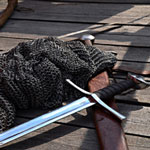Holidays Calendar for February 29, 2020
World Sword Swallowers Day, sometimes referred to as International Sword Swallowers Day, is observed annually on the last Saturday of February. It was created to celebrate the exciting and dangerous art of sword swallowing and raise funds to help injured sword swallowers.
If you have a bottle of wine that you have been saving for a special occasion, but that occasion never seems to come, you should open it on the last Saturday of February because it’s Open That Bottle Night! This holiday was created specifically to encourage people to enjoy wine and share it with their loved ones.
Curling Day is celebrated in Canada on the last Saturday of February. It was created to honor a winter sport that originated in Scotland but is particularly popular in Canada.
Festivals for February 29, 2020
- Strumica Carnival in Strumica, North Macedonia
- Sydney Gay and Lesbian Mardi Gras Parade in Sydney, Australia
- Adelaide Writers’ Week in Adelaide, Australia
- Chicago Comic & Entertainment Expo (C2E2) in Chicago, USA
- Playlist Live in Orlando, USA
- New Zealand Fringe Festival in Wellington, New Zealand
- Adelaide Festival in Adelaide, Australia
- Latvian Book Fair in Riga, Latvia
- FEST (Belgrade International Film Festival) in Belgrade, Serbia
- Enlighten Canberra in Canberra, Australia
- PAX East in Boston, USA
- Carnival of Bern in Bern, Switzerland
- Gdakon in Gdansk, Poland
- Dublin International Film Festival in Dublin, Ireland
- Dubai Food Festival in Dubai, UAE
This Day in History
- 2020 Died: Éva Székely, Hungarian swimmer. She won the gold medal at the 1952 Summer Olympics in Helsinki and the silver medal at the 1956 Summer Olympics, and set six world records.
- 2020 The United States and Taliban signing the Agreement for Bringing Peace to Afghanistan in Doha, Qatar, bringing an end to the 2001-2021 war in Afghanistan.
- 2012 The construction of Tokyo Skytree was completed. Tokyo Skytree is a broadcasting, restaurant, and observation tower in Japan It is the tallest tower and the second tallest structure in the world.
- 2004 Haitian president Jean-Bertrand Aristide was ousted in a coup d'état. An interim government led by Prime Minister Gérard Latortue and President Boniface Alexandre was installed in Haiti.
- 1996 Faucett Flight 251 crashed on approach to Rodríguez Ballón International Airport in Arequipa, Peru, killing all 123 people aboard. It is the deadliest accident that occurred on Peruvian soil.
- 1996 Died: Princess Shams Pahlavi, the elder sister of Mohammad Reza Pahlavi, the last Shah of Iran. She left Iran for the United States after the Islamic Revolution of 1979 and died of cancer in Santa Barbara.
- 1992 An independence referendum began in Bosnia and Herzegovina, following the first free elections of 1990 and the rise of ethnic tensions that led to the breakup of the Socialist Federal Republic of Yugoslavia.
- 1992 Born: Jessica Long, Russian-born United States Paralympic swimmer. She has held world records in several events in her class and has won multiple gold medals over three Summer Paralympics.
- 1980 Died: Yigal Allon, Israeli politician, a commander of the Palmach, and a general in the Israeli Defense Forces. He was a Knesset member and government minister from the third Knesset through the ninth.
- 1980 Died: Gil Elvgren (born Gilette Elvgren), American painter of pin-up girls, advertising and illustration. Elvgren was one of the most important pin-up and glamor artists of the twentieth century.
- 1976 Born: Ja Rule (stage name of Jeffrey Atkins), American rapper, singer, and actor. From 1999 to 2005, Ja Rule had several hits that made the top 20 of the United States Billboard Hot 100 chart.
- 1968 Born: Eugene Volokh, Ukrainian-American lawyer and educator. He is best known for his blog The Volokh Conspiracy dedicated to legal and political issues, which he founded in 2002.
- 1960 A 5.7-magnitude earthquake in Morocco killed around 12,000 people, injured another 12,000, left 35,000 people homeless, and nearly destroyed the city of Agadir in the southern part of the country.
- 1960 Died: Melvin Purvis, American law enforcement official and FBI agent. Purvis is noted for leading the manhunts that tracked famous outlaws such as Baby Face Nelson, Pretty Boy Floyd, and John Dillinger.
- 1940 Hattie McDaniel became the first African American to win an Academy Award for her role as Mammy in Gone with the Wind. The film received 10 Academy Awards (8 competitive, 2 honorary) from 13 nominations.
- 1936 Born: Jack R. Lousma, American aeronautical engineer, retired United States Marine Corps officer, former naval aviator, NASA astronaut, and politician. He was a member of the second manned crew on Skylab.
- 1928 Died: Adolphe Appia, Swiss architect and theorist of stage lighting and décor. He is best known for his many scenic designs for Wagner’s operas and for creating a new perspective of scene design and stage lighting.
- 1928 Born: Seymour Papert, American mathematician, computer scientist, and educator. He is one of the pioneers of artificial intelligence and co-inventor of the Logo programming language (with W. Feurzeig).
- 1928 Born: Terry Lewis, Australian police officer who was convicted and jailed for corruption and forgery as a result of the Fitzgerald Inquiry. He was sentenced to the maximum jail term possible.
- 1920 Czechoslovak National Assembly adopted the new constitution that established Czechoslovakia as a republic and democracy. The document was modeled after constitutions of established Western democracies.
- 1920 Born: Michèle Morgan, French film actress and singer, who was a leading lady for three decades. For her contribution to the motion picture industry, Morgan has a star on the Hollywood Walk of Fame.
- 1916 The United Kingdom annexed Tokelau and included it in the Gilbert and Ellice Islands colony. Nine years later, Tokelau was placed under the jurisdiction of the Governor-General of New Zealand.
- 1908 Died: Pat Garrett, American Old West lawman, bartender and customs agent who became renowned for killing Billy the Kid. He was also the sheriff of Lincoln County and Doña Ana County, New Mexico.
- 1908 Died: John Hope, 1st Marquess of Linlithgow, Scottish aristocrat, politician and colonial administrator. He is best known for his brief and controversial tenure as the first Governor-General of Australia.
- 1896 Born: Morarji Desai, Indian independence activist and the 4th Prime Minister of India who served from 1977 to 1979. He was the first Prime Minister to head the country's first non-Congress Government.
- 1868 Died: Ludwig I of Bavaria, king of Bavaria from 1825 until the 1848 revolutions in the German states. He abdicated on March 20, 1848, in favor of his eldest son Maximilian (Maximilian II of Bavaria).
- 1860 Born: Herman Hollerith, American inventor who developed an electromechanical punched card tabulator. He also founded The Tabulating Machine Company that can be considered the predecessor of IBM.
- 1792 Born: Gioachino Rossini, Italian composer who wrote 39 operas as well as sacred music, chamber music, songs, and instrumental and piano pieces. He is best known for his operas La Cenerentola and Guillaume Tell.
- 1768 Polish nobles formed the so-called Bar Confederation in order to defend the internal and external independence of the Polish–Lithuanian Commonwealth against Russian influence.
- 1744 Died: John Theophilus Desaguliers, French-born British natural philosopher, clergyman, engineer and freemason who was elected to the Royal Society in 1714 as experimental assistant to Isaac Newton.
- 1720 Queen Ulrika Eleonora of Sweden abdicated in favor of her husband, Landgrave Frederick of Hesse-Kassel, who became King Frederick I on March 24. He ruled the country for 31 years.
- 1528 Died: Patrick Hamilton, Scottish churchman and early protestant reformer. He was burnt at the stake as a heretic outside the front entrance to St Salvator's Chapel in St Andrews, Scotland.


